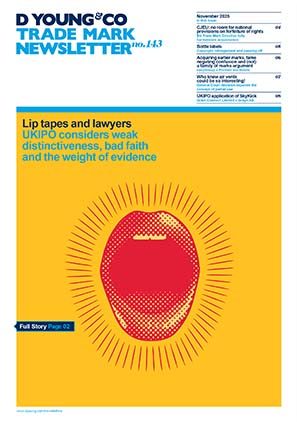EasyGroup v Beauty Perfectionists: the troubles of enforcing a not so-distinctive trade mark
EasyGroup Limited’s infringement claim against Beauty Perfectionists Limited's use of signs containing “easyCOSMETIC” was dismissed by the UK High Court.
In summary, easyGroup claimed that Beauty Perfectionists' use of “easyCOSMETIC” infringed its easyJet word marks on the grounds of a likelihood of confusion and reputation. Despite being able to rely on the existence of a family of marks (which was found to attribute a level of distinctiveness to the term “easy” used in a particular font and colour), and some consumer emails noting the similarities between the marks at issue, easyGroup was unsuccessful in its infringement claim.
The decision highlights that even if a trade mark with a low degree of inherent distinctiveness becomes popular, rights in that mark are likely to be limited and difficult to enforce against ostensibly similar signs, particularly where there has been coexistence in the marketplace. Moreover, it highlights the courts’ strict approach with regard to evidence of confusion.
Likelihood of confusion
Marks: With regard to the similarity of the marks, the court found that the marks had some visual and conceptual similarities due to them both starting with the term “easy” and the thick font and orange colouring used. However, the fact that “easy” was a “common descriptive adjective” used by other traders was noted. This impacted the effect of principles such as the tendency of consumers to focus on the start of a mark.
Services: In its consideration of the similarity of the services the court found that the inflight retail of cosmetics was similar to the online retail of cosmetics.
Family of marks: Where it is shown that a claimant has used a “family” of trade marks with a common feature, and a disputed sign shares that common feature, this may support the existence of a likelihood of confusion or a link.
In assessing EasyGroup’s family of marks the court did not accept that use of the term EASY was understood as indicative of easyGroup. However, easyGroup could rely on its family’s reputation, resting in the term “easy” in combination with the common font and colourings used, when considering the enhanced distinctiveness of the easyJet mark.
Context of use: It was noted that there was nothing on Beauty Perfectionists' website to indicate any connection with the easyJet airline businesses. Moreover, the use of orange design elements on Beauty Perfectionists' website was considered too far remote from the easyCOSMETIC signs to have any impact.
Evidence of confusion: In its evidence of confusion easyGroup relied on various emails from consumers including some that stated it initially believed Beauty Perfectionists' services were from an easyGroup brand. However, the court did not regard these as instances of “actual confusion”, but only initial confusion or “questions” as to whether there was a link.
Overall, the court found that any similarities between the marks were offset by the visual and conceptual differences and context of Beauty Perfectionists' use.
This finding was reinforced by the fact that, after many years of parallel trading, no instance of actual confusion had been identified.
Reputation
In relation to reputation claim, it was found that only the sign that contained orange and black stylisation could arguably be seen to create a link to the easyJet trade mark.
However, it was subsequently found that there would be no detriment to the distinctive character of easyJet. EasyGroup had claimed there would be damage to the strength of the “easy” family. However, these claims were found to be based on speculation and, in any event, the court commented that the question is not whether there is detriment to the family reputation but detriment to the distinctive character of the easyJet mark relied upon.
EasyGroup’s claim also failed on the basis of unfair advantage, as no reasoning was provided as to why the strength of its reputation in the easyJet trade mark, which related to an airline, could be used to benefit the retail of cosmetics. EasyGroup’s best argument related to the assertion that the formation of a link allowed for Beauty Perfectionists to “trade on the trust that people have in the easy family of brands”, however, no evidence of this was provided.
As a result, the infringement claim failed in its entirety. Therefore, the court did not deem it necessary to consider Beauty Perfectionists' defence that the signs complained of were descriptive and non-distinctive.
Case details at a glance
Jurisdiction: England and Wales
Decision level: High Court
Parties: easyGroup Limited v Beauty Perfectionists Limited, et al
Date: 13 June 2024
Citation: [2024] EWHC 1441 (Ch)

